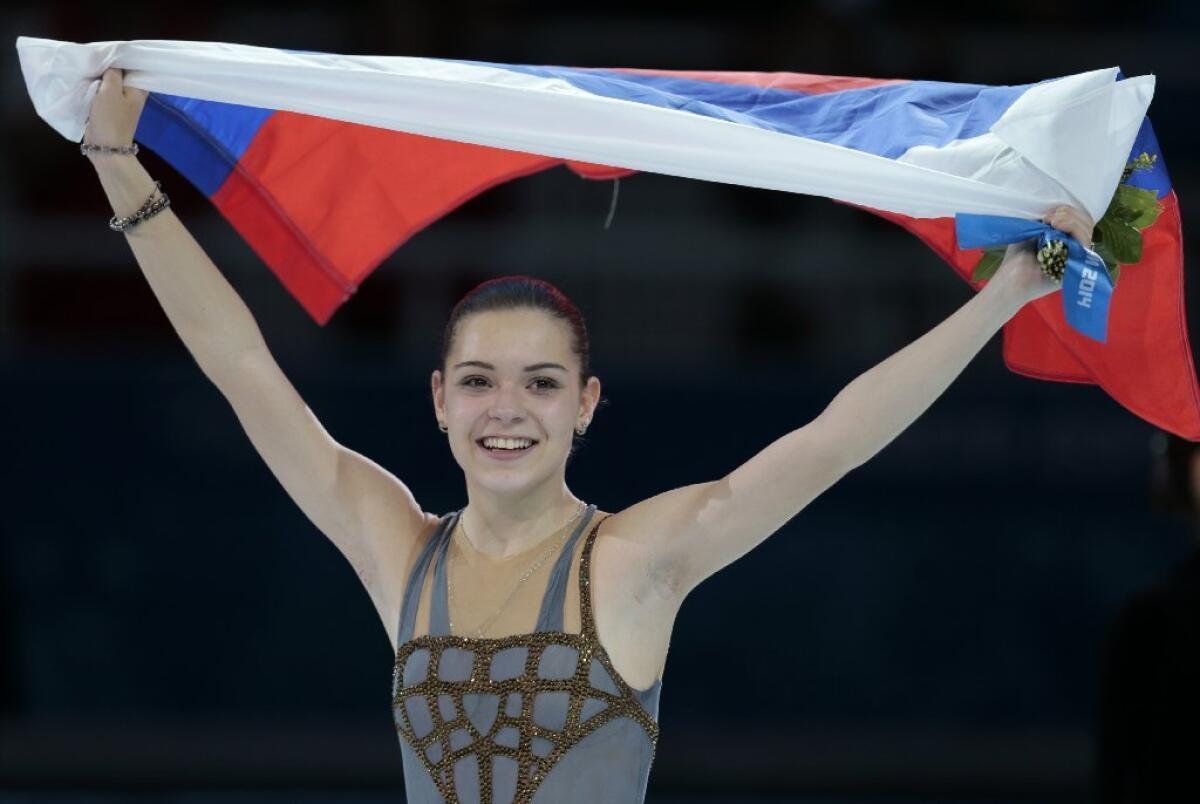Sochi Olympics TV: Did NBC cover the Sotnikova-Kim controversy well?

- Share via
A good controversy gets fans mad, but it also makes TV networks excited.
When short-program leader Yuna Kim of South Korea skated a seemingly flawless performance Thursday in the women’s figure-skating long program at the Sochi Olympics--but still lost the gold medal to challenger Adelina Sotnikova of Russia--NBC was in a prime position. If a beautiful performance is the bronze medal of figure-skating coverage, and a star-in-the-making is its silver, a good and juicy brouhaha is gold, the thing that keeps commentators occupied and viewers tuned in.
But the challenging part is getting the controversy right, and NBC wobbled a bit, though it ultimately steadied the landing and offered some useful insight.
PHOTOS: Olympic Games TV moments worth remembering
The first snag came before any scores were handed out, when commentators gushed over Kim’s performance without picking up on any hint of what might unfold. “The queen still reigns,” Tom Hammond said of Kim’s performance, while analysts Scott Hamilton and Sandra Bezic extolled and extolled her some more.
Kim didn’t make any real mistakes, and sure, the nature of a controversial result is that it’s unexpected. But in the exuberance to coronate, shouldn’t there have been a little skepticism? Or at least a recognition of what judges might find problematic; after all, commentators’ skill in a sport like figure skating is not only to gauge a performance but tell us how judges may feel about it.
Indeed, there was a general reluctance to criticize Kim; to my eyes no one was really doing it until after the scoring happened, and even then it was very slight. Sandra Bezic, long after the scores had come in, was still saying that Kim “is truly the queen of figure skating.” Only Johnny Weir, a standout throughout these games, was willing to vocalize that Kim’s performance didn’t quite, well, land. “She was a little flat. She was the queen but she was flat,” he told Bob Costas in the studio.
It got a little thornier. When the scoring did go down in Sotnikova’s favor, there was little consensus about why it had happened.
The in-race commenters seemed to suggest that Sotnikova had skated a better technical run, as everyone noted her attempt of seven jumps instead of Kim’s eventual six, adding to the in-race commentary about how Sotnikova was racking up points ”like a cash register.” Tracey Wilson was brought in to make a John King-like assessment of points and scoring. It was all very arithmetic. But later Weir suggested to Bob Costas that the technical didn’t really matter and it was an impression the judges were responding to. “It’s all about creating the moment. Adelina technically won the judging blah blah blah, but Adelina created that moment,” he said.
PHOTOS: Winter Olympics in film
Dissenting opinion in the commentating realm is good and welcome. But it’s a fine line between that and viewers leaving confused about why something happened.
There’s an inherent conflict in a situation like this. A controversy is what gooses ratings. But commentators, especially those who were or remain part of a sports establishment, tend to reflexively play down the extent of an injustice, and that leads to some squirmy contradictions. Listen to Hamilton after the competition, on Sotnikova:
“She [did] what every skater dreams about... she skated brave, she skated strong, she skated aggressively. She skated athletically. It was fun, it was spectacular,” he added. Not exactly the words used to describe someone who just stole a title. Shouldn’t that at least been a little toned down if Kim was a deserving and flawless queen?
It took former champion and longtime broadcaster Dick Button, often the conscience of the sport but not a commentator at these Games, to offer something that felt both candid and plausible.
“Sotnikova was energetic, strong, commendable, but not a complete skater. I fear I will never be allowed back in Russia again,” he tweeted, also adding, “Dear Yu-Na, you are a true champion.”
PHOTOS: Behind the scenes of movies and TV
Still, some slack should be cut. In a night of crystalline skating and confusing rules, NBC analysts were in a tough spot. It didn’t all make sense on the ice, which is why it didn’t make all sense at home. Kudos, also, to Costas, who made sure to gently press the three American competitors what they thought of the judging, not an easy thing to do given their youth and athlete-ish conservatism.
Former gold medalist Tara Lipinski--more than a little familiar with viewer backlash herself--had perhaps the most astute comment. Asked by Costas how she thought Kim felt at this moment, she said, “She was pleased with her performance but not happy.” It was that kind of evening all around.
More to Read
The complete guide to home viewing
Get Screen Gab for everything about the TV shows and streaming movies everyone’s talking about.
You may occasionally receive promotional content from the Los Angeles Times.







